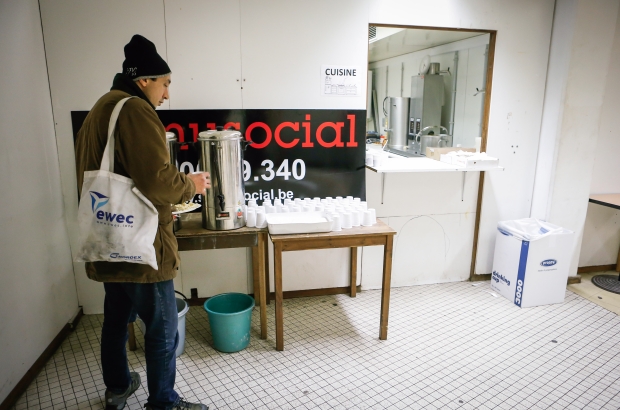- Daily & Weekly newsletters
- Buy & download The Bulletin
- Comment on our articles
Cold snap: Some Belgian cities to arrest homeless who refuse shelter
As the cold snap continues across Belgium and at least one homeless person has died, some municipalities are detaining those who refuse shelter from the freezing temperatures.
In places including Liège and the Brussels municipality of Etterbeek, authorities have issued regulations that allow police to detain homeless people who refuse shelter in order to prevent them from spending the night in the cold.
The measure in Etterbeek takes effect automatically as soon as night temperatures reach -5°C and will remain in force until the end of February, with the caveat that detention is only possible after police have had a doctor assess the health of the homeless individual and the safety risk posed by a shelterless night.
In Liège, where the temperatures have dropped as low as -8°C, the mayor has issued a similar regulation that remains in effect until 22 January, with extensions possible.
Aid organisation SamuSocial said that some homeless people – particularly minors and migrants staying in Belgium illegally – reject accommodation because of the rules imposed at shelters.
“They have difficulty with the restrictions on the internet or mobile phones, with the distance from the centre of Brussels and also with the times when going out at night is forbidden, when it is precisely during the night that they feel they have a chance of finding a means of transport to cross the Channel,” Christophe Thielens told RTBF.
“We also have to be honest and admit that quite a few of these young people are addicted to drugs and are reluctant to abide by the no-drug rules in force at the Fedasil centres.”
Many of Brussels’ homeless are undocumented migrants.
Of the 1,160 places available to accommodate them in the region, almost half (500) are currently occupied by homeless families. Of those 500 places, 330 are for minors under the age of 18, who take priority - along with single women and families - when it comes to aid.
“As it's cold, night-time accommodation is actually extended 24 hours a day for families,” said Thielens.
“We're not going to kick them out and ask them to phone to ask for a place the next night, as is the case for the men. As a result, not many places become available, and as our two reception centres reserved for families are almost full, we sometimes have to turn away new families.”
Thielens said this was the case earlier in the month when a family had to be turned away. Since that instance, the city’s cold weather plan went into effect and extra spots opened, but SamuSocial cannot rule out a refusal nonetheless due to capacity limitations.
“Our intention is to take in all the families and children who turn up, without refusing any, but we can never be sure that we will succeed,” said Thielens.
Unaccompanied minors are often among the most difficult to convince to seek shelter.
“Most of the [unaccompanied minors] we meet in transit come from Eritrea, Ethiopia, Sudan or North Africa, mainly Algeria or Morocco,” said Adrien Long, a social worker at SOS Jeunes, a non-profit organisation that helps young people in transit.
"They are often just passing through, wanting to get to the UK or northern countries, and have no intention of staying in Belgium.
"As a result, the Fédasil centres seem unsuitable to them, as we want to teach them French and prepare them for a stay here with courses and training, which doesn't fit in with their plans."
Long would like to see specialised shelters for this demographic, especially as some elect to sleep on the street rather than check into a shelter despite the freezing temperatures, but acknowledged that the aid network is under immense pressure as it is.
Photo: Bruno Fahy/Belga


















